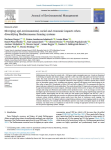Rezgui F., Lambarraa-Lehnhardt F., Blanc L., Plaza-Bonilla D., Lampurlanes J., Dordas C., Papakaloudis P., Michalitsis A., Latati M., Raggas A., Bellingrath-Kimura S.D., Paul C., Reckling M. (2025). Diverging agri-environmental, social and economic impacts when diversifying Mediterranean farming systems. Journal of Environmental Management, 01/10/2025, vol. 393, p. 127040.
https://doi.org/10.1016/j.jenvman.2025.127040
https://doi.org/10.1016/j.jenvman.2025.127040
| Titre : | Diverging agri-environmental, social and economic impacts when diversifying Mediterranean farming systems (2025) |
| Auteurs : | F. Rezgui ; F. Lambarraa-Lehnhardt ; L. Blanc ; D. Plaza-Bonilla ; J. Lampurlanes ; C. Dordas ; P. Papakaloudis ; A. Michalitsis ; M. Latati ; A. Raggas ; S.D. Bellingrath-Kimura ; C. Paul ; M. Reckling |
| Type de document : | Article |
| Dans : | Journal of Environmental Management (vol. 393, October 2025) |
| Article en page(s) : | p. 127040 |
| Langues : | Anglais |
| Langues du résumé : | Anglais |
| Catégories : |
Catégories principales 06 - AGRICULTURE. FORÊTS. PÊCHES ; 6.4 - Production Agricole. Système de ProductionThésaurus IAMM SYSTEME DE PRODUCTION ; DIVERSIFICATION ; EVALUATION DE L'IMPACT ; IMPACT SUR L'ENVIRONNEMENT ; IMPACT ECONOMIQUE ; IMPACT SOCIAL ; REGION MEDITERRANEENNE ; ESPAGNE ; GRECE ; ALGERIE |
| Résumé : | Mediterranean diets are based on cereals with ∼200 kg per capita consumption per year. Cereals are threatened by declining soil quality and climate change, expected to alter crop yields and quality and increase food insecurity. This study assessed the agri-environmental, social, and economic performance of diversified farming systems across three case studies. We compared continuous cereal cropping as a reference system (RS) to various types of diversified systems (DIV), including grain legumes, rapeseed, and legume-cereal intercropping in the Ebro valley in Spain (ES), Thessaloniki in Greece (GR), and Setif in Algeria (DZ). The assessment was based on impact indicators validated by local stakeholders. The results showed that DIV improved social aspects, followed by agri-environmental and economic impacts, with large variation between sites. In Spain, DIV showed higher nitrogen and energy use efficiencies and resulted in lower production costs (−26 % on average). In Greece, DIV had higher agri-environmental and social performance than RS, with intercropping outperforming rapeseed and legume systems. Intercropping was the only Greek DIV with positive gross margins (186 EUR ha−1 year−1). Despite European DIV improving some resource use efficiencies and food quality indicators compared to RS, their economic returns (without subsidies) remain mostly lower than those of continuous cereal cropping. The Algerian DIV had 10 out of 23 impact indicators outperforming continuous cereal cropping, mainly in social and economic dimensions. We conclude that diversification practices can result in divergent impacts in the Mediterranean. Our study serves as a foundation not only for the co-design of appropriate systems in the region but also for policies supporting systems’ changes. |
| Cote : | En ligne |
| URL / DOI : | https://doi.org/10.1016/j.jenvman.2025.127040 |







